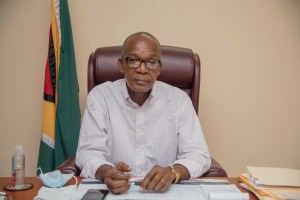Extracted and modified from DPI
Minister of Labour, Hon. Joseph Hamilton said the Ministry’s Board of Industrial Training (BIT) is seeking to have its programs internationally certified and accredited with the aim of making the programmes internationally recognized.
The Minister said the initiative is being done in partnership with the Council for Technical, Vocational Education and Training (TVET).
On Tuesday, Minister Hamilton visited the villages of Ladern’s Ville, Hururu and Kwakwani located along the Upper Berbice River, Region Ten. The activity was part of an outreach programme to sensitise citizens countrywide about the opportunities for skills training through BIT.
“Guyana, in two years’ time, if you are not certified and accredited you will be a nobody regardless of how much skill you have. So, we have linked up with the TVET Council which have linked up with the Caribbean CTVET to ensure that programmes BIT is certifies and accredited, meaning you can work anywhere,” he told residents at the Ladern’s Ville Community Ground.
Minister Hamilton said currently, BIT offers more than 83 skills training programmes which are accessible to citizens countrywide. These include motor mechanics, plumbing, catering, cake decorating, garment construction, ICT, small engine and solar panel repairs and heavy-duty equipment operation.
However, the Minister explained these programmes were mostly centred in Georgetown and its environs, and was not reaching the far-flung areas. However, he said, this will change going forward to ensure the programmes are more inclusive, and accessible to all citizens.
“There are two types of programmes. We train people who don’t have a skill at all, and outside of that they have people who have a skill but what they lack is certification and accreditation…There is no gender specific programmes and there is no age limit to these programmes and there is no qualification to access these programmes.”
Minister Hamilton encouraged the communities to organize themselves into groups with a maximum of 20 persons and request training programmes that are needed within the communities. The facilitators must also be drawn from the respective communities or the regions.
